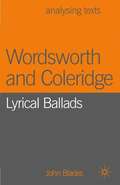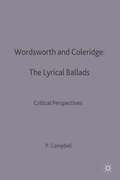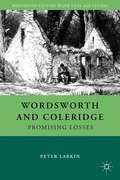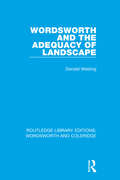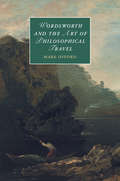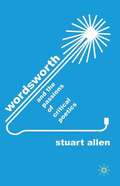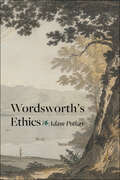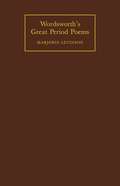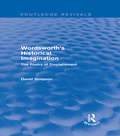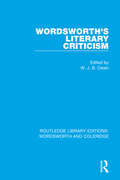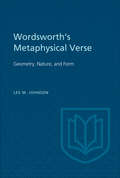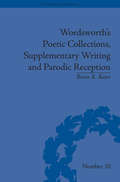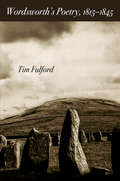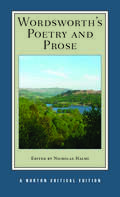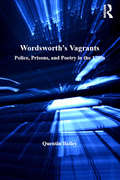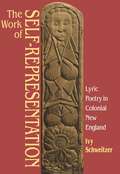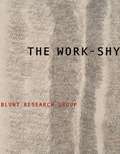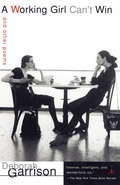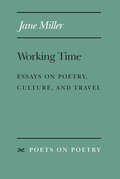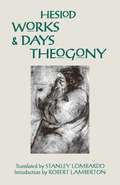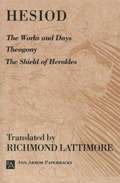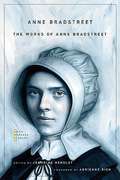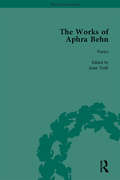- Table View
- List View
Wordsworth and Coleridge: Lyrical Ballads
by John BladesWritten in an age of revolutions, Lyrical Ballads represents a radical new way of thinking - not only about literature but also about our fundamental perceptions of the world. The poetry of Wordsworth and Coleridge continues to be among the most appealing and challenging in the rich tradition of English Literature; and Lyrical Ballads, composed at the height of the young authors' creative powers, is now widely acclaimed as a landmark in literary history. In this lively study, detailed analysis of individual poems is closely grounded in the literary, political and historical contexts in which Lyrical Ballads was first conceived, realised and subsequently expanded into two volumes. John Blades examines poetry from both volumes and carefully reassesses the poems in the light of Wordsworth's and Coleridge's revolutionary theories, while Part II of the study broadens the discussion by tracing the critical history of Lyrical Ballads over the two centuries since its first publication. Providing students with the critical and analytical skills with which to approach the poems, and offering guidance on further study, this stimulating book is essential reading.
Wordsworth and Coleridge
by Patrick CampbellLyrical Ballads have always been wedded to controversy. Though the judgments of the periodicals and the ensuing authorial reaction have long since been superseded by a plethora of scholarly interpretations, the debate still focuses on their elusive, paradoxical character. Are the poems traditional or experimental, a random collocation or an organized sequence? Patrick Campbell surveys the critical fluctuations of nearly two centuries while privileging recent approaches which have sought fresh perspectives on the volume - contextual, formalist and genre-based, psycho-analytic, materialist, maverick. The Ancient Mariner, Tintern Abbey, The Thorn and The Idiot Boy accorded individual treatment. The author then offers a personal interpretation of all the remaining poems and considers the vexed issue of the unity of Lyrical Ballads from a fresh perspective.
Wordsworth and Coleridge
by Peter LarkinWordsworth and Coleridge: Promising Losses assembles essays spanning the last thirty years, including a selection of Peter Larkin's original verse, with the concept of promise and loss serving as the uniting narrative thread.
Wordsworth and the Adequacy of Landscape (RLE: Wordsworth and Coleridge #12)
by Donald WeslingFirst published in 1970, this stylistic and interpretative account of some of Wordsworth’s major poetry examines description and meditation in his landscape writing. It describes the integration of two kinds of thinking, and a variety of beauties and lapses that come from their separation. Although Wordsworth’s deepest affinity was with nature, the author argues the finest landscape writing of the poet’s late twenties and early thirties derives from his attempt to humanise his love of nature. This work therefore aims to examine the way in which Wordsworth strives in his poetry to extend his range of concern from love of nature to love of mankind.
Wordsworth and the Art of Philosophical Travel (Cambridge Studies in Romanticism)
by Mark OffordAt the heart of Wordsworth's concerns is the question of how travel - both foreign and everyday - might also become an adventure into philosophy itself. This is an art of travel both as an approach to experience - one that draws on habits in order to revise them in the shock of new - and as a poetic approach that gives voice to the singular and foreign through the unique shapes of verse. Close readings of Wordsworth's 'pictures of Nature, Man, and Society' show how the natural is entangled with - and not simply opposed to, as many critics have suggested - the social, the political and the historical in this verse. This book draws on both eighteenth-century anthropology and travel literature, and debates in modern critical theory, to highlight Wordsworth's remarkable originality and his ongoing ability to transform our theoretical prejudgements in the unknown territory of the travel encounter.
Wordsworth and the Enlightenment Idea of Pleasure
by Rowan BoysonAncient questions about the causes and nature of pleasure were revived in the eighteenth century with a new consideration of its ethical and political significance. Rowan Boyson reminds us that philosophers of the Enlightenment, unlike modern thinkers, often represented pleasure as shared rather than selfish, and she focuses particularly on this approach to the philosophy and theory of pleasure. Through close reading of Enlightenment and Romantic texts, in particular the poetry and prose of William Wordsworth, Boyson elaborates on this central theme. Covering a wide range of texts by philosophers, theorists and creative writers from over the centuries, she presents a strong defence of the Enlightenment ideal of pleasure, drawing out its rich political, as well as intellectual and aesthetic, implications.
Wordsworth and the Passions of Critical Poetics
by Stuart AllenThis scholarly study presents a new political Wordsworth: an artist interested in 'autonomous' poetry's redistribution of affect. No slave of Whig ideology, Wordsworth explores emotion for its generation of human experience and meaning. He renders poetry a critical instrument that, through acute feeling, can evaluate public and private life.
Wordsworth's Ethics
by Adam PotkayA comprehensive examination that breathes new life into Wordsworth and the ethical concerns that were vital to his nineteenth-century readers.Why read Wordsworth’s poetry—indeed, why read poetry at all? Beyond any pleasure it might give, can it make one a better or more flourishing person? These questions were never far from William Wordsworth’s thoughts. He responded in rich and varied ways, in verse and in prose, in both well-known and more obscure writings.Wordsworth's Ethics is a comprehensive examination of the Romantic poet’s work, delving into his desire to understand the source and scope of our ethical obligations. Adam Potkay finds that Wordsworth consistently rejects the kind of impersonal utilitarianism that was espoused by his contemporaries James Mill and Jeremy Bentham in favor of a view of ethics founded in relationships with particular persons and things. The discussion proceeds chronologically through Wordsworth’s career as a writer—from his juvenilia through his poems of the 1830s and '40s—providing a valuable introduction to the poet’s work. The book will appeal to readers interested in the vital connection between literature and moral philosophy.
Wordsworth's Great Period Poems: Four Essays
by Marjorie LevinsonThe book presents four major poems from Wordsworth's great period of creativity, 1798-1805: Tintern Abbey, Michael, The Intimations Ode, Peele Castle.
Wordsworth's Historical Imagination: The Poetry of Displacement (Routledge Revivals)
by David SimpsonTraditionally, Wordsworth’s greatness is founded on his identity as the poet of nature and solitude. The Wordsworthian imagination is seen as an essentially private faculty, its very existence premised on the absence of other people. In this title, first published in 1987, David Simpson challenges this established view of Wordsworth, arguing that it fails to recognize and explain the importance of the context of the public sphere and the social environment to the authentic experience of the imagination. Wordsworth’s preoccupation with the metaphors of property and labour shows him to be acutely anxious about the value of his art in a world that he regarded as corrupted. Through close examination of a few important poems, both well-known and relatively unknown, Simpson shows that there is no unitary, public Wordsworth, nor is there a conflict or tension between the private and the public. The absence of any clear kind of authority in the voice that speaks the poems makes Wordsworth’s poetry, in Simpson’s phrase, a ‘poetry of displacement’.
Wordsworth's Literary Criticism (RLE: Wordsworth and Coleridge #13)
by W. J. B. OwenFirst published in 1974. Wordsworth, with Coleridge, is the major literary critic of the Romantic period. This volume assembles all of Wordsworth’s formal critical writings and a selection of critical comments from his correspondence. These documents are invaluable for Romantic poetry at large, and his theories — particularly on poetic diction, ordinary language and the nature of the creative process — inspired lively critical debate. This book discusses the nature and origin of Wordsworth’s criticism in general, and the literary tradition from which they sprang. The texts are succinctly annotated and there is a select bibliography. This book will be of interest to students of literature.
Wordsworth's Metaphysical Verse: Geometry, Nature, and Form
by Lee JohnsonIn his philosophic verse, Woodsworth identifies the history of poetry and geometrical thought as the two chief treasures of the mind and as main sources of his poetic inspiration. He assigns transcendental value to geometry and indicates that he attempts to apply its proportions to the laws of nature. In this book, Professor Johnson demonstrates how Wordsworth also employed geometrical patterns in the metrical construction of his verse and how the character of those patterns can be related to the poet's major philosophical values. Johnson shows how Wordsworth, when writing about the nature and significance of geometrical thought in The Prelude and The Excursion, designs his verse paragraphs in accordance with simple geometrical proportions which are thereby associated with the metaphysical value he attributes to geometry. Wordsworth finds geometrical forms to be hidden in the natural landscape and inherent in the structures of perception itself. This book is the first to make a sustained description of Wordsworth's symbolic patterns and metrical forms in his philosophic verse, with major examples drawn from Tintern Abbey, The Prelude, The Excursion, and the Immortality Ode. Although it presents an approach which differs radically from any in the established criticism of the poet, it is basically at one with the large body of work that concerns the nature of Wordsworth's imagination.
Wordsworth's Poetic Collections, Supplementary Writing and Parodic Reception (The History of the Book #10)
by Brian R BatesWordsworth’s process of revision, his organization of poetic volumes and his supplementary writings are often seen as distinct from his poetic composition. Bates asserts that an analysis of these supplementary writings and paratexts are necessary to a full understanding of Wordsworth’s poetry.
Wordsworth's Poetry, 1815-1845 (Haney Foundation Series)
by Tim FulfordThe later poetry of William Wordsworth, popular in his lifetime and influential on the Victorians, has, with a few exceptions, received little attention from contemporary literary critics. In Wordsworth's Poetry, 1815-1845, Tim Fulford argues that the later work reveals a mature poet far more varied and surprising than is often acknowledged. Examining the most characteristic poems in their historical contexts, he shows Wordsworth probing the experiences and perspectives of later life and innovating formally and stylistically. He demonstrates how Wordsworth modified his writing in light of conversations with younger poets and learned to acknowledge his debt to women in ways he could not as a young man. The older Wordsworth emerges in Fulford's depiction as a love poet of companionate tenderness rather than passionate lament. He also appears as a political poet—bitter at capitalist exploitation and at a society in which vanity is rewarded while poverty is blamed. Most notably, he stands out as a history poet more probing and more clear-sighted than any of his time in his understanding of the responsibilities and temptations of all who try to memorialize the past.
Wordsworth’s Poetry and Prose
by Nicholas HalmiThis Norton Critical Edition presents a generous selection of William Wordworth's poetry (including the thirteen-book Prelude of 1805) and prose works along with supporting materials for in-depth study. Together, the Norton Critical Editions of Wordsworth's Poetry and Prose and The Prelude: 1799, 1805, 1850 are the essential texts for studying this author. Wordsworth's Poetry and Prose includes a large selection of texts chronologically arranged, thereby allowing readers to trace the author's evolving interests and ideas. An insightful general introduction and textual introduction precede the texts, each of which is fully annotated. Illustrative materials include maps, manuscript pages, and title pages. "Criticism" collects thirty responses to Wordsworth's poetry and prose spanning three centuries by British and American authors. Contributors include Samuel Taylor Coleridge, Percy Bysshe Shelley, Felicia Hemans, Ralph Waldo Emerson, Lucy Newlyn, Stephen Gill, Neil Fraistat, Mary Jacobus, Nicholas Roe, M. H. Abrams, Karen Swann, Michael O'Neill, and Geoffrey Hartman, among others. The volume also includes a Chronology, a Biographical Register, a Selected Bibliography, and an Index of Titles and First Lines of Poems.
Wordsworth's Vagrants: Police, Prisons, and Poetry in the 1790s (British Literature In Context In The Long Eighteenth Century Ser.)
by Quentin BaileyWordsworth's Vagrants explores the poet's treatment of the 'idle and disorderly' in the context of the penal laws of the 1790s, when the terror of the French Revolution caused a crackdown on the beggars and vagrants who roamed the English countryside. From his work on the Salisbury Plain poems through to the poetry about vagrants, beggars, and lunatics in Lyrical Ballads, Quentin Bailey argues, Wordsworth attempted to imagine a way of relating to the vagrant and criminal poor that could challenge the systematizing impulses of William Pitt and Jeremy Bentham. Whereas writers had previously relied on sensibility and fellow-feeling to reveal the correct ordering of society, Wordsworth was writing in a period in which legislators, magistrates, and commentators agreed that a more aggressively interventionist approach and new institutional solutions were needed to tackle criminality and establish a disciplined and obedient workforce. Wordsworth's interest in individual psychology and solitude, Bailey suggests, grew out of his specific awareness of the Bloody Code and the discussions surrounding it. His study offers a way of reading Wordsworth's poetry that is sensitive to his early radicalism but which does not equate socio-political engagement solely with support for the French Revolution.
The Work of Self-Representation
by Ivy SchweitzerIn The Work of Self-Representation Ivy Schweitzer examines early American poetry through the critical lens of gender. Her concern is not the inclusion of female writers into the canon; rather, she analyzes how the metaphors of "woman" and "feminine" function in Puritan religious and literary discourse to represent both the "otherness" of spiritual experience and the ways in which race and class function to keep the "other" in marginalized positions.Schwetizer argues that gender was for seventeenth-century new England -- and still is today -- a basic and most politically charged metaphor for the differences that shape identity and determine cultural position. To glimpse the struggle between gender ideology and experience, Schweitzer provides close readings of the poetry of four New Englanders writing between the Great Migration and the first wave of the Great Awakening: John Fiske, Edward Taylor, Anne Bradstreet, and Roger Williams.Schweitzer focuses exclusively on lyric poetry, she says, because a first-person speaker wrestling with the intricacies of individual consciousness provides fruitful ground for exploring the politics of voice and identity and especially problems of authority, intertextuality, and positionality. Fiske and Taylor define the orthodox tradition, and Bradstreet and Williams in different ways challenge it. Her treatment of the familiar poetry of Bradstreet and Taylor is solidly grounded in historical and literary scholarship yet suggestive of the new insights gained from a gender analysis, while discussions of Fiske and Williams bring their little-known lyric work to light.Taken together, these poets' texts illustrate the cultural construction of a troubled masculinity and an idealized, effaced femininity implicit in the Puritan notion of redeemed subjectivity, and constitute a profoundly disturbing and resilient part of our Puritan legacy.
The Work-Shy (Wesleyan Poetry Ser.)
by Blunt Research GroupThe Work-Shy painstakingly reconstructs a chorus of voices rescued from hermetic “colonies” and fragile communes, from worlds that work in ways that defy work as we know it. Its poetic assemblages offer direct testimony from the first youth prison in California and from asylums for the chronically insane (preserved in the Prinzhorn Collection in Germany and the Creedmoor Psychiatric Center in New York City). Painful facts emerge about “sterilization mills” in California, where thousands of individuals became subject to compulsory procedures (policies that shaped eugenics practice in the Third Reich). In addition, the poems “translate” asylum texts--the writing of the insane--into a wider field of social conflict and utopian fragments of not-yet-being.Activating what Susan Howe calls “the telepathy of the archive” (and Peter Gizzi dubs “archeophonics” in the title of his latest collection), the poems of The Work-Shy become part of a “book of listening,” occupying identities rooted in the demimonde and in places of confinement. Voices echo to form a ragged chain of soliloquies, kenning and keening, riddles and rants. Published under the collective, anonymous signature of the BLUNT RESEARCH GROUP, the book operates at the crossroads of lyric and documentary poetries, of singularity and collectivism. An online readers companion will be available at bluntresearchgroup.site.wesleyan.edu.
A Working Girl Can't Win: And Other Poems
by Deborah GarrisonDeborah Garrison, whose work as an editor and writer has enlivened the pages of The New Yorker for more than a decade, evokes the characters and events of her everyday life with intense feeling and, more important, conjures up the universal dilemmas and pleasures of a young woman trying to come to terms with love and work.
Working Time: Essays on Poetry, Culture, and Travel (Poets On Poetry)
by Jane MillerWorking Time collects essays by prize-winning poet Jane Miller on the subjects of poetry, travel, and culture. The discussions of contemporary poetry begin with excursions into geography, where language literally “takes shape.” Each essay is set in a landscape, where the notion of travel as a poetic experience, from the American Southwest to places in Italy, France, and Spain, is explored. The essays consider notions of time, duration, narrative, documentary, and history in American poetry, and view poetry in the light of developments in feminism, postmodern theory, and contemporary poetic practice. In addition to poetry, Miller investigates a range of cultural products and art forms, including film, video, photography, painting, sculpture, music, and the Madonna phenomenon.
Works and Days and Theogony (Hackett Classics)
by Robert Lamberton Hesiod Stanley Lombardo"Robert Lamberton's Introduction is an excellent, concise exposition of current scholarly debate: his notes are informative and helpful. . . . Those who want a translation that captures something of the spirit of an ancient Greek poetic voice and its cultural milieu and transmits it in an appealing, lively, and accessible style will now turn to Lombardo." --M. A. Katz, Wesleyan University, in CHOICE
The Works and Days; Theogony; The Shield of Herakles
by Richmond A. Lattimore HesiodThree epic poems by one who has been called the first Greek philosopher and theologian.
The Works of Anne Bradstreet (John Harvard Library)
by Jeannine HensleyAnne Bradstreet was one of our earliest feminists and the first true poet in the American colonies. This collection of her extant poetry and prose, scrupulously edited by Jeannine Hensley, has long been the standard edition of Bradstreet’s work. Hensley’s introduction sketches the poet’s life, and Adrienne Rich’s foreword offers a sensitive critique of Bradstreet as a person and as a writer. The John Harvard Library edition includes a chronology of Bradstreet’s life and an updated bibliography.
The Works of Aphra Behn: The Plays, 1678-1682 (The Pickering Masters)
by Janet ToddAphra Behn (1640-1689) was one of the most successful dramatists of the Restoration theatre and a popular poet. This is the first volume in a set of seven which comprises a complete edition of all her works. This volume is a collection of her poetry.
Works of Auvaiyar:Atichuti, Konrai Vendan, Muturai and Nalvazhi
by Auvaiyari) AticuTi: contains 109 morals in one line with few words ii)Konrai Vendhan: 91 one line moral verses the first letter of each starts with alphabetical and consonants order. iii) Muturai: contains 40 verses of four lines each preaching morals and ethics. iv) Nalvazhi: contains 40 verses of advises of good deeds that will lead to a good life.
